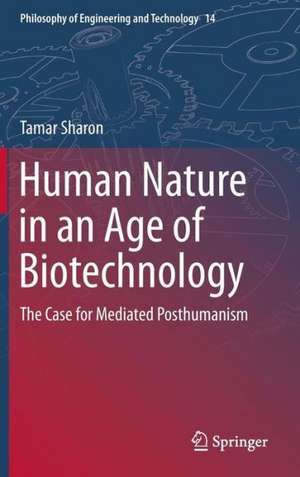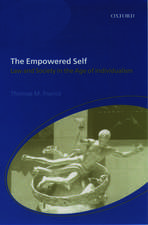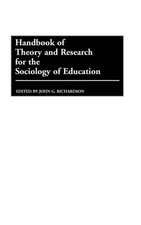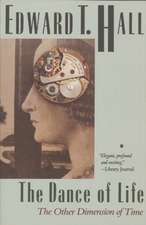Human Nature in an Age of Biotechnology: The Case for Mediated Posthumanism: Philosophy of Engineering and Technology, cartea 14
Autor Tamar Sharonen Limba Engleză Hardback – 24 oct 2013
The volume offers a comprehensive mapping of posthumanist discourse divided into four broad approaches—two humanist-based approaches: dystopic and liberal posthumanism, and two non-humanist approaches: radical and methodological posthumanism. The author compares and contrasts these models via an exploration of key issues, from human enhancement, to eugenics, to new configurations of biopower, questioning what role technology plays in defining the boundaries of the human, the subject and nature for each.
Building on the contributions and limitations of radical and methodological posthumanism, the author develops a novel perspective, mediated posthumanism, that brings together insights in the philosophy of technology, the sociology of biomedicine, and Michel Foucault’s work on ethical subject constitution. In this framework, technology is neither a neutral tool nor a force that alienates humanity from itself, but something that is always already part of the experience of being human, and subjectivity is viewed as an emergent property that is constantly being shaped and transformed by its engagements with biotechnologies. Mediated posthumanism becomes a tool for identifying novel ethical modes of human experience that are richer and more multifaceted than current posthumanist perspectives allow for.
The book will be essential reading for students and scholars working onethics and technology, philosophy of technology, poststructuralism, technology and the body, and medical ethics.
| Toate formatele și edițiile | Preț | Express |
|---|---|---|
| Paperback (1) | 385.62 lei 6-8 săpt. | |
| SPRINGER NETHERLANDS – 18 sep 2016 | 385.62 lei 6-8 săpt. | |
| Hardback (1) | 392.97 lei 6-8 săpt. | |
| SPRINGER NETHERLANDS – 24 oct 2013 | 392.97 lei 6-8 săpt. |
Din seria Philosophy of Engineering and Technology
- 9%
 Preț: 627.13 lei
Preț: 627.13 lei -
 Preț: 378.64 lei
Preț: 378.64 lei - 15%
 Preț: 662.95 lei
Preț: 662.95 lei -
 Preț: 280.88 lei
Preț: 280.88 lei - 20%
 Preț: 551.32 lei
Preț: 551.32 lei - 15%
 Preț: 646.75 lei
Preț: 646.75 lei - 24%
 Preț: 806.76 lei
Preț: 806.76 lei - 18%
 Preț: 1110.86 lei
Preț: 1110.86 lei - 18%
 Preț: 958.07 lei
Preț: 958.07 lei - 15%
 Preț: 645.28 lei
Preț: 645.28 lei - 15%
 Preț: 644.63 lei
Preț: 644.63 lei -
 Preț: 394.12 lei
Preț: 394.12 lei -
 Preț: 393.52 lei
Preț: 393.52 lei - 15%
 Preț: 638.90 lei
Preț: 638.90 lei - 15%
 Preț: 660.04 lei
Preț: 660.04 lei - 15%
 Preț: 654.43 lei
Preț: 654.43 lei - 15%
 Preț: 646.43 lei
Preț: 646.43 lei - 18%
 Preț: 788.90 lei
Preț: 788.90 lei - 15%
 Preț: 646.75 lei
Preț: 646.75 lei -
 Preț: 370.49 lei
Preț: 370.49 lei -
 Preț: 387.78 lei
Preț: 387.78 lei - 18%
 Preț: 735.07 lei
Preț: 735.07 lei - 18%
 Preț: 956.18 lei
Preț: 956.18 lei - 15%
 Preț: 637.59 lei
Preț: 637.59 lei - 18%
 Preț: 1009.40 lei
Preț: 1009.40 lei - 18%
 Preț: 787.91 lei
Preț: 787.91 lei - 15%
 Preț: 638.89 lei
Preț: 638.89 lei - 20%
 Preț: 566.76 lei
Preț: 566.76 lei - 18%
 Preț: 725.43 lei
Preț: 725.43 lei
Preț: 392.97 lei
Nou
Puncte Express: 589
Preț estimativ în valută:
75.20€ • 82.01$ • 63.41£
75.20€ • 82.01$ • 63.41£
Carte tipărită la comandă
Livrare economică 24 aprilie-08 mai
Preluare comenzi: 021 569.72.76
Specificații
ISBN-13: 9789400775534
ISBN-10: 9400775539
Pagini: 285
Ilustrații: X, 241 p. 2 illus.
Dimensiuni: 155 x 235 x 23 mm
Greutate: 0.53 kg
Ediția:2014
Editura: SPRINGER NETHERLANDS
Colecția Springer
Seria Philosophy of Engineering and Technology
Locul publicării:Dordrecht, Netherlands
ISBN-10: 9400775539
Pagini: 285
Ilustrații: X, 241 p. 2 illus.
Dimensiuni: 155 x 235 x 23 mm
Greutate: 0.53 kg
Ediția:2014
Editura: SPRINGER NETHERLANDS
Colecția Springer
Seria Philosophy of Engineering and Technology
Locul publicării:Dordrecht, Netherlands
Public țintă
ResearchCuprins
Chapter 1. Introduction.- Chapter 2. A Cartography of the Posthuman.- Chapter 3. The Human Enhancement Debate: For, Against and from Human Nature.- Chapter 4. Towards a Non-Humanist Posthumanism: The Originary Prostheticity of Radical and Methodological Posthumanism.- Chapter 5. From Molar to Molecular Bodies: Posthumanist Frameworks in Contemporary Biology.- Chapter 6. Posthuman Subjectivity: Beyond Modern Metaphysics.- Chapter 7. Technologically Produced Nature: Nature Beyond Schizophrenia and Paranoia.- Chapter 8. New Modes of Ethical Selfhood: Geneticization and Genetically Responsible Subjectivity.- Chapter 9. Conclusion.
Textul de pe ultima copertă
New biotechnologies have propelled the question of what it means to be human – or posthuman – to the forefront of societal and scientific consideration. This volume provides an accessible, critical overview of the main approaches in the debate on posthumanism, and argues that they do not adequately address the question of what it means to be human in an age of biotechnology. Not because they belong to rival political camps, but because they are grounded in a humanist ontology that presupposes a radical separation between human subjects and technological objects.
The volume offers a comprehensive mapping of posthumanist discourse divided into four broad approaches—two humanist-based approaches: dystopic and liberal posthumanism, and two non-humanist approaches: radical and methodological posthumanism. The author compares and contrasts these models via an exploration of key issues, from human enhancement, to eugenics, to new configurations of biopower, questioning what role technology plays in defining the boundaries of the human, the subject and nature for each.
Building on the contributions and limitations of radical and methodological posthumanism, the author develops a novel perspective, mediated posthumanism, that brings together insights in the philosophy of technology, the sociology of biomedicine, and Michel Foucault’s work on ethical subject constitution. In this framework, technology is neither a neutral tool nor a force that alienates humanity from itself, but something that is always already part of the experience of being human, and subjectivity is viewed as an emergent property that is constantly being shaped and transformed by its engagements with biotechnologies. Mediated posthumanism becomes a tool for identifying novel ethical modes of human experience that are richer and more multifaceted than current posthumanist perspectivesallow for.
The book will be essential reading for students and scholars working on ethics and technology, philosophy of technology, poststructuralism, technology and the body, and medical ethics.
The volume offers a comprehensive mapping of posthumanist discourse divided into four broad approaches—two humanist-based approaches: dystopic and liberal posthumanism, and two non-humanist approaches: radical and methodological posthumanism. The author compares and contrasts these models via an exploration of key issues, from human enhancement, to eugenics, to new configurations of biopower, questioning what role technology plays in defining the boundaries of the human, the subject and nature for each.
Building on the contributions and limitations of radical and methodological posthumanism, the author develops a novel perspective, mediated posthumanism, that brings together insights in the philosophy of technology, the sociology of biomedicine, and Michel Foucault’s work on ethical subject constitution. In this framework, technology is neither a neutral tool nor a force that alienates humanity from itself, but something that is always already part of the experience of being human, and subjectivity is viewed as an emergent property that is constantly being shaped and transformed by its engagements with biotechnologies. Mediated posthumanism becomes a tool for identifying novel ethical modes of human experience that are richer and more multifaceted than current posthumanist perspectivesallow for.
The book will be essential reading for students and scholars working on ethics and technology, philosophy of technology, poststructuralism, technology and the body, and medical ethics.
Caracteristici
Presents a comparison of models via an exploration of key issues, from human enhancement, to eugenics, and new configurations of biopower Offers a new perspective on human-technology relations that evades the dichotomy of “protecting” ourselves from technology vs. embracing technology as progress Includes a special chapter on molecular biomedicine and evolutionary biology links STS and philosophy of technology to current trends in biology












